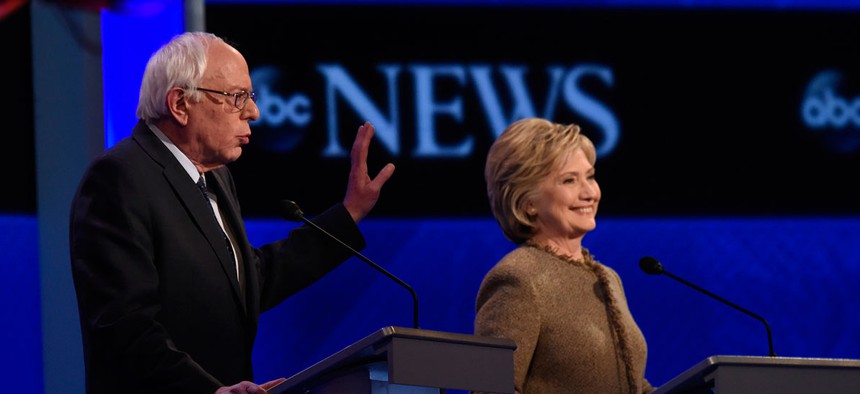
Ida Mae Astute/ABC
Clinton is Stuck In Late-Primary Limbo
With Bernie Sanders sticking around, Clinton’s plans for pivoting to the general are still mostly on hold.
Hillary Clinton can now feel Barack Obama’s pain.
The former secretary of State declared Tuesday night after a decisive primary win in New York that “victory is in sight,” with a nearly insurmountable delegate lead over Bernie Sanders and just more than a handful of primary dates left on the calendar.
But the Sanders campaign signaled he intends to stick it out until the final primaries in June, or through the July convention, meaning Clinton will have to wait to fully pivot to the general election.
It’s a reversal of fortunes from 2008, when it was Clinton who refused to drop out even as Obama was well on his way to winning the Democratic nomination. Clinton soldiered on through early June, while Obama became the presumptive Democratic nominee weeks earlier.
“It was the greatest six weeks of our lives,” former Obama speechwriter Jon Favreau mused in a recent appearance on The Bill Simmons Podcast. “It was some point in April we woke up thinking, ‘We are going to spend the rest of our lives running against Hillary Clinton in this primary, and nothing’s ever going to change. This is now purgatory.’”
The Clinton campaign may now feel the same way about Sanders.
After New York, Clinton holds a 695-delegate lead over Sanders, including super delegates. That advantage means Sanders would need to win 71 percent of all remaining delegates to catch up, according to tallies by NBC News.
“As far as who’s actually going to win, that was decided even before last night, but last night was the exclamation point,” said Mitch Stewart, Obama’s 2012 battleground-state director.
In her victory speech Tuesday night and in stump speeches in New York over the weekend, Clinton took direct aim at potential Republican rivals Donald Trump and Ted Cruz, and didn’t mention Sanders by name. But her campaign activity in the next five states, scheduled to hold primaries on April 26—Connecticut, Delaware, Maryland, Pennsylvania, and Rhode Island—reflect a campaign that is by necessity still focused logistically on her matchup with Sanders.
“Rhetorically she’s obviously made more of a pivot, there’s no doubt,” said Florida Democratic strategist Steve Schale. “But I’d think organizationally they’ll begin to start making real moves toward the general election after Maryland and Pennsylvania.”
Clinton is continuing to drive wedges between herself and Sanders in states that vote Tuesday, primarily on gun violence. Clinton held an event Wednesday in Philadelphia to discuss the issue, and will hold a similar one in Hartford, Conn., later this week.
In Maryland, Rep. Elijah Cummings is featured in a new Clinton radio ad discussing the 2011 shooting death of his nephew. The Clinton campaign also released a new TV ad Wednesday in Connecticut and Rhode Island featuring the daughter of Dawn Hochsprung, the principal killed at Sandy Hook Elementary in Newtown in 2012.
Much of Clinton’s outreach on guns has centered around African-Americans, who will make up a sizable share of Democratic primary voters in four of the five states voting next week. The vote is centered in cities including Philadelphia, Baltimore, Wilmington, and Hartford. Many also expect Clinton to continue talking about gun violence in the general-election campaign.
And Clinton is airing a Spanish-language TV ad in Pennsylvania and Connecticut that takes aim at Trump over his views on immigrants. The ad, which initially launched in New York, was her second to take Trump to task by name.
Logistically, Clinton hasn’t begun to staff up to any significant degree in battleground states. That will likely happen soon, and it could track with the way it played out on the Democratic side in 2008.
Both Schale and Stewart were general-election state directors for Obama in 2008—in Florida and Virginia, respectively—and recalled being selected for those positions in May and starting by early June, around the time Clinton dropped out.
The tricky part for Clinton is continuing to compete with Sanders while not alienating his supporters, whom she hopes to win over before November.
The NBC News/Wall Street Journal national poll this week illustrated how split the party remains. It found Clinton ahead of Sanders by just a 2-point margin, while a comparison of NBC News/Wall Street Journalpolls from 2008 and 2016 found that, by a 12-point margin, Clinton voters then held a more favorable view of Obama than Sanders backers do of Clinton now.
In 2008, Clinton played a key role in bringing her supporters over to Obama by swiftly endorsing and campaigning for him. How the current race plays out after Clinton secures the nomination could rest on what Sanders does to bridge the divide.
“There is a certain hope, for sure, and expectation, to some degree, that after the primary is over he signals to his supporters what’s really at stake in a general election,” Stewart said. “Having a President Donald Trump would be an absolute disaster, and I think everybody recognizes that.”






